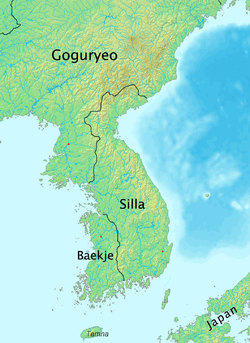Silla Kingdom
| Silla | ||||||||||||
| 신라 (新羅) | ||||||||||||
|
||||||||||||
|
Pre-Unified Silla at its height in 576.
|
||||||||||||
| Capital | Gyeongju (Geumseong, then Seorabeol) | |||||||||||
| Languages |
Silla language (Part of Old Korean) |
|||||||||||
| Religion | Buddhism, Confucianism, Taoism, Korean shamanism | |||||||||||
| Government | Monarchy | |||||||||||
| King | ||||||||||||
| • | 57 BC – 4 | Hyeokgeose (first) | ||||||||||
| • | 540–576 | Jinheung | ||||||||||
| • | 654–661 | Muyeol | ||||||||||
| • | 661–681 | Munmu | ||||||||||
| • | 681–692 | Sinmun | ||||||||||
| • | 927–935 | Gyeongsun (last) | ||||||||||
| History | ||||||||||||
| • | Establishment | 57 BC | ||||||||||
| • | Introduction of Buddhism | 530 | ||||||||||
| • | Campaigns of King Jinheung | 551–585 | ||||||||||
| • | Unified Silla | 668–935 | ||||||||||
| • | Handover to the Goryeo Dynasty | 935 AD | ||||||||||
| Population | ||||||||||||
| • | 6th century est. | 750,000 | ||||||||||
| • | 8th century est. | 2,000,000 | ||||||||||
|
||||||||||||
| Today part of |
|
|||||||||||
| Silla | |
| Hangul | |
|---|---|
| Hanja | |
| Revised Romanization | Silla |
| McCune–Reischauer | Silla |
|
Monarchs of Korea Silla (Pre-unification) |
|
|
Monarchs of Korea Silla (Post-unification) |
|
Silla (57 BC – 935 AD) (Hangul: 신라; Hanja: 新羅; RR: Silla Korean pronunciation: [ɕil.la]) was one of the Three Kingdoms of Korea, and one of the world's longest sustained dynasties. Although it was founded by King Park Hyeokgeose, the dynasty was ruled by the Gyeongju Kim (김, 金) clan for most of its 992-year history. It began as a chiefdom in the Samhan confederacies, once allied with China, but Silla eventually conquered the other two kingdoms, Baekje in 660 and Goguryeo in 668. Thereafter, Unified Silla or Later Silla, as it is often referred to, occupied most of the Korean Peninsula, while the northern part re-emerged as Balhae, a successor-state of Goguryeo. After nearly 1000 years of rule, Silla fragmented into the brief Later Three Kingdoms, Silla, Hubaekje, and Taebong, handing over power to its successor dynasty Goryeo in 935.
...
Wikipedia


